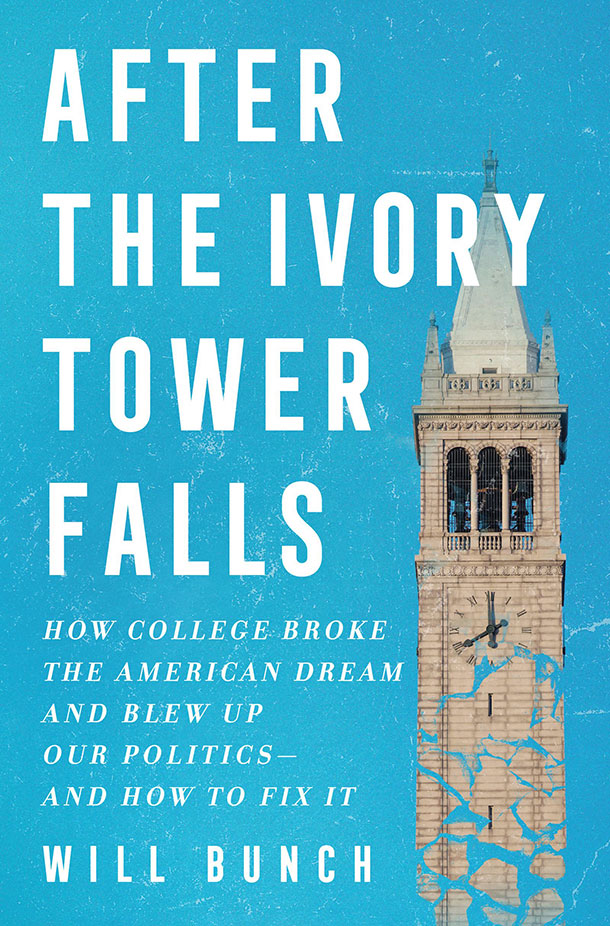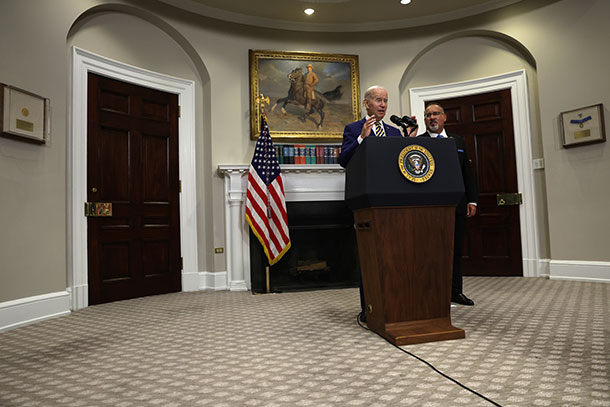Policy
Columnist Will Bunch talks higher education and how college has become a cultural flashpoint for people
In his new book, Bunch examines the political forces that drive people apart in what experts call the ‘college/non-college’ divide.

Will Bunch; Student loan borrowers celebrate President Joe Biden canceling student debt. Yong Kim; Paul Morigi/Getty Images
Philadelphia Inquirer columnist Will Bunch has made a name for himself writing books, columns and stories on some of the most pressing issues in American politics.
In his latest book, “After the Ivory Tower Falls: How College Broke the American Dream and Blew Up Our Politics – and How to Fix It,” Bunch examines the political and cultural forces that have made higher education a national political flashpoint and offers a roadmap on how to make college work for everyone. In an exclusive interview with City & State, Bunch walked through some of the major findings of his new book, offered thoughts on Pennsylvania’s midterm elections and even provided some advice on how to restore public confidence in journalism.
This interview has been condensed and edited for length and clarity.
What are some of the major takeaways from your research into the intersection of college and politics?
I was curious about what experts now call the college/non-college divide. What I mean by that is the fact that increasingly you see the Democrats becoming the party of people with a college education or a bachelor's degree, and increasingly, the Republican Party has built its appeal around the white, working-class people without diplomas. That’s not the way I was taught as a political science major. We were taught that, “It’s the economy, stupid,” and that the class differences are more important, but this is different. It’s not something logical that you’d expect college to determine which party you're going to vote for.
So, I went on this journey to understand why, because to me, if there’s a college divide in American politics, then there’s something about higher education itself that’s causing that, and so I decided to tell the whole modern history of college in America. To me, that history is so intertwined with the wider cultural and political history of America since World War II, because World War II was when college became the American dream. For a couple of generations, you had a golden age of college where it was eminently affordable for most people and accessible and a ladder up for the middle class. Then starting around the 1970s or ’80s, that ladder started getting taken down. College in America was privatized, and we went to a system in which college became incredibly expensive in terms of tuition. The government developed a system that really required most families to take out loans to meet the difference between what college costs and what they could afford, which resulted in this $1.75 trillion mountain of debt that we’re just finally starting to realize we have to do something about.

You write about this “resentment” toward both educators and bureaucrats and politicians. Why does this exist and what is driving it?
In recent generations, we’ve absorbed this idea that our system in America is basically what people now call a meritocracy, meaning that everybody has an opportunity to get ahead, theoretically, and the people who do get ahead are the ones who work harder, or bring intelligence or some kind of talent to the table, and are rewarded first with the basic merit badge of the meritocracy, which is a college diploma, and then with success in their career and other places.

We’ve absorbed this idea without really much thought about what we’re really seeing with the meritocracy. There are two problems here. One is that it’s not really a meritocracy; it’s rigged to a great extent. There are so many built-in advantages for people who start out at the top of the system to keep their family and to stay at the top – by the resources they’re able to devote on their children for preparing for the SATs, which are supposed to be the ultimate test of who has merit, but can be gamed by lots of expensive preparation, and by systems like legacy admission at the elite universities that leave very few slots for people who aren’t connected. The other thing is that college became more expensive and admission became more restrictive. So the avenues for regular middle-class folks to get a great college education started to shut down. A lot of people who didn’t get through the system either because of the cost or because they didn’t have the aptitude for modern college and who didn’t get degrees are wondering, ‘Am I being looked down on? It seems like these people with college degrees, the professional-managerial class, the people from these cosmopolitan communities look down on me because I’m a blue-collar worker – because I don’t have a college diploma,’ which fuels this whole idea of rural resentment.
Are there any solutions that can close the divide and also help make higher education more accessible?
To me, fixing college starts with this long-running debate that we’ve had: Is college a public good? Meaning that society is responsible for absorbing the cost of college just in the same way that we’ve done for centuries now with K-12 education that everybody’s property taxes (pay for). We came close to adopting that system in the Golden Age of the 1940s, ’50s and ’60s and didn’t, of course, and it was undone by privatization. To fix the problem, we need to get away from the privatization mindset and back to the public good mindset. The underlying significance of what President Biden did last month on student debt is, in a way, the first small movement back towards that public good ideal, because what he was telling a couple of generations of Americans who racked up this debt since the 1990s, 2000s, 2010s, is that you were cheated, because baby boomers – and to a lesser extent, Generation X – did get a chance to go to college when tuition was subsidized by taxpayers and it was lower – something that these next generations were deprived of, unfairly. Debt cancellation is an acknowledgment of that to some degree. The question now is, can we take more radical steps going forward that would take the burden of tuition off of families that don’t have this money, particularly Black and brown families that have 1/20 the family net worth of white families because of our legacy of white privilege.
If you want to avoid the next debt crisis, you have to make higher education affordable going forward, and that’s going to take probably some radical steps that are beyond what we’ve done in recent years.
You’ve written a lot about extremism, democracy and the significance of the midterms in Pennsylvania. How important are this year’s contests in terms of preserving democratic and institutional norms?
I think one race really epitomizes the challenge and that’s the race for governor in Pennsylvania. Doug Mastriano has really become the avatar for how extreme views have taken over the Republican Party. He was unstoppable in the primary. For those of us who aren’t in that world, it’s kind of hard to understand, but he’s able to leverage church congregations and his communities on Facebook of people who deeply distrust the system, who buy into conspiracy theories like QAnon, like the Big Lie about election fraud in America. He had a divided field and he was able to get 40% of the primary vote, and now this extremist is the Republican nominee for governor.
So the stakes are enormously high. Josh Shapiro is a kind of bland, kind of center-of-the-road figure. I haven’t written much about him because I’m just not super-excited by his ideas, but I’m excited by the fact that he’s not Doug Mastriano – that he’s a guy who we can count on to at least support democracy in Pennsylvania and support policies that, at least in his mind, are aimed at the public good and not at some theological far-right movement. It might be, in some ways, the most important election I’ve ever covered in my lifetime.

How do you cover false information and false claims by politicians? How do you determine what to highlight versus what to ignore when we’re constantly saturated by information that can often be false or misleading?
I belong to the school that thinks that false information can’t be ignored. It has to be confronted, because it’s just too pervasive right now. I think the feeling that a lot of journalists have – and it’s an understandable feeling … if we, as the mainstream media, give some of these ideas oxygen, it’s going to make it worse instead of better. I understand that argument, but I think these problems have been out there long enough that we see how it plays out. It turns out that literally crazy ideas like QAnon can take root in the public. I’m not saying the majority of Americans believe in QAnon – they don’t. But in a nation of 330 million people, there are many millions who do buy into these ideas. These are ideas that can and have promoted violence and certainly promote political hatred – the idea that your enemies aren’t just people that you disagree with, but demonic somehow and motivated by Satan – nothing good is going to come out of that. I think these lies and disinformation that are out there – and they need to be monitored. If it’s blatantly, provably false – then you should call a lie a lie.

A Gallup poll from over the summer showed that Americans have less confidence in newspapers and TV news outlets than ever before. You’re a veteran of this industry. Do you think that confidence can be restored in today’s climate?
I think what a lot of journalists believe – what I believe – is that we don’t have the full power to control how people react to what we do. We can only control what we do. I think journalism starts from the moral principle of trying to get at the truth and report (that) to people and write (it) up, and we're just gonna keep doing it till the day they cart us out in a box or whatever.
In today’s journalism, of course, there’s an aspect of interacting with people, promotion and responding to people online and engaging in conversations – and maybe that’s a part of convincing some people, but at the end of the day, you just have to throw your energies into writing what you think is right and true and important, and have enough faith in humanity that enough people are going to react positively to it and that you’re going to have a positive effect. Yes, there are dark forces out there that want to steer things in a different direction, but I think the responsibility of the journalist is to do what’s right.
NEXT STORY: This week’s biggest Winners & Losers
